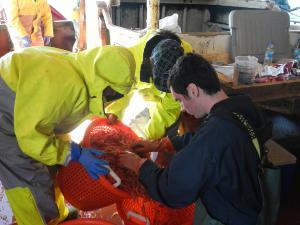News
Tuesday, October 29, 2013

Sorting bycatch from shrimp catch on board the F/V Newfie Pride as part of the shrimp trawl seabed reduction project. Left to Right: Harold Delouche, Tara Perry, Andrew Murphy.
Memorial M.Sc. Biology candidate, Andrew Murphy has had no shortage of success during his graduate studies.
His most recent accomplishment was being named the sole recipient of the Best Student Poster award at the 2013 World Seafood Congress in St. John’s this October. Murphy claimed the $500 award for his research project that focused on reducing seabed impacts of bottom trawls in Newfoundland’s inshore Northern shrimp fishery.
The poster session was a new addition to the conference this year and was designed to showcase innovative research from seafood professionals who are actively engaged in providing creative solutions to the many challenges facing today’s global seafood industry.
Murphy is conducting his master’s research at the Marine Institute’s (MI) Centre for Sustainable Aquatic Resources (CSAR). Under the guidance and supervision of Dr. Scott Grant and co-supervisor Dr. Paul Winger, Murphy works closely with industry to help solve various problems within the fisheries of Newfoundland and Labrador.
In March, Murphy was named the Lewis, Gunn & Livingston (LGL) Limited Scholarship in Marine Science 2013 recipient, valued at $3000. After winning the scholarship, Murphy was intent on working for LGL Limited, one of North America’s leading ecological research companies providing biological consulting services to the public and private sectors.
Murphy’s persistence paid off. In early October he began working full time as a biologist for LGL Limited.
“LGL Limited is a diverse company. My work here will expose me to assessing and mitigating various aspects of environmental challenges in such industrial sectors as oil and gas, mining and forestry,” said Murphy. “So far my work as involved updating reports on offshore oil seismic exploration and its effects on fish and fish habitat. I will be moving onto field survey work soon, assessing populations of the endangered boreal felt lichen [leaf-like- part fungus/part algae].”
Nearing the end of his graduate studies, Murphy has presented his thesis and will graduate with his master’s degree at Memorial’s convocation ceremony in May 2014. His graduate research has landed him several awards including: Best Poster at the 2012 MUN Biology Graduate Student Symposium, and a 2012-2013 RDC Ocean Industries Student Research Award, valued at $20,000 over one year for his research project on the use of fish pots (stationary fishing gear) to capture flatfish species while reducing the incidental capture of snow crab in the Green Bay region around Triton, NL.
This year he was also the recipient of the Clemens-Rigler Travel Award 2013, which he used to help offset travel costs to attend and present his research at the Canadian Conference for Fisheries Research in Windsor, Ontario.
Murphy attributes a lot of his success to CSAR’s assistant director, Kelly Moret, who first guided him to the institute through MI International before conducting his master’s research at the centre. Murphy’s initial experience with MI was a six month internship with MI International and the Canadian International Development Agency where he worked at Bunda College in Lilongwe, Malawi as a sustainable food production specialist, learning and performing aquaculture techniques.
He also participated in a student short-term international attachment with MI International and JB Lacson University in Iloilo city, Philippines during his master’s where he learned a great deal about ecological park management, and marine sanctuary development.
“I am very thankful for the opportunities that MI International has provided me in gaining valuable international work experience,” said Murphy.
During his time at CSAR Murphy participated in two main research projects which became the focus of chapters in his thesis: an Atlantic Innovation Fund (AIF) project aimed at reducing seabed impacts of shrimp bottom trawls in Newfoundland’s inshore Northern shrimp fishery and a flatfish project aimed at capturing commercial quantities of turbot and American plaice using stationary fish pot gear modified from the original NL cod pot design.
“Overall, I’ve really enjoyed my time at MI. The work at CSAR ties science to industry and economics. It’s been great to have the opportunity to interlace academics with work in commercial sectors and industry in an attempt to develop more sustainable fishing practices,” explained Murphy. “I’m extremely grateful to the CSAR team, and specifically Dr. Grant and Dr. Winger who have provided me excellent direction and support throughout my master’s degree and have led me to this point in my career.”





